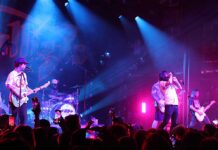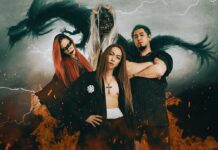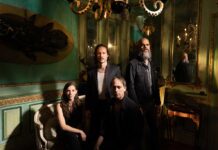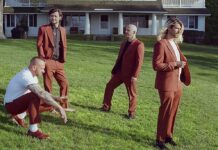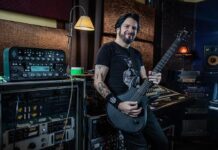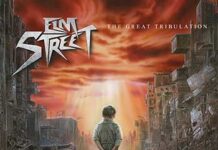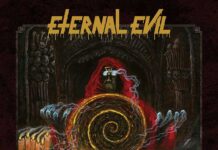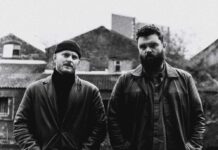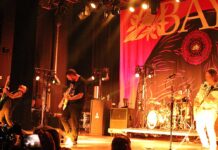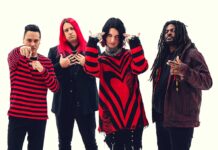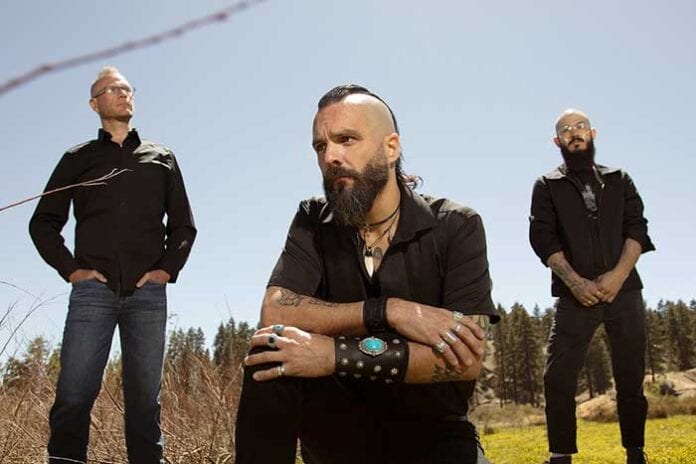
INTERVIEW WITH JESSE LEACH BY KELLEY SIMMS
PHOTOGRAPHS BY HRISTO SHINDOV
Times of Grace—the side-project between current Killswitch Engage members Adam Dutkiewicz (vocals/guitar/bass) and Jesse Leach (vocals)—has returned with its expansive second full-length album, Songs of Loss and Separation, 10 years after its debut.
Times of Grace is a completely different animal compared to Killswitch Engage, and Songs of Loss and Separation stands out from the first Times of Grace album, The Hymn of a Broken Man as well. Delving into grunge, gothic, and alt metal territory by creating solemn, melancholic, dissonant, and melodic soundscapes, the duo finds a safe haven and a common ground to create their art. The passion on this record is emotionally draining and highly therapeutic in the most creative of ways. In a way, Times of Grace has revolutionized melancholy.
Jesse recently spoke with us about the writing process for the new album, the lyrical inspiration, sharing vocal duties with Adam, his hardcore punk project The Weapon, and what the future holds for Times of Grace.
It’s been 10 years since Times of Grace’s first album. The most obvious question is, what took so long?
Between touring with Killswitch constantly, and then trying to balance out the downtime, living our lives, it’s been a busy decade of Killswitch and me coming back. We also have other projects that we work on. So, we just get it in where we fit it in. That’s why it’s a project. There’s a part of me that really enjoys the fact that we can spare the time, and it isn’t rushed because we’re able to really brood over the songs and make sure everything is exactly the way we want it to be.

Was making this album a way to get some stuff off your chests? Is Times of Grace another creative outlet apart from Killswitch Engage and something different to do?
Yeah, it’s definitely a nice creative outlet that’s something different for sure. It’s nice to be able to not worry about staying within a particular signature sound, which we tend to do with Killswitch. There are really no rules with this. And there are no expectations as well, which is nice. We joke that we can’t make an album unless something tragic happens in one of our lives. The last record we were both going through something, and then this record, we were both going through stuff. We’re talking about loss, death, separation. I was going through a divorce. All that stuff came out in the lyrics. It’s definitely a therapeutic record and it’s not necessarily hopeful and as bright as the last one. It feels like a very raw, honest album as far as the lyrics and the vibe.
“WE TAKE OUR PAIN AND SUFFERING AND MAKE IT INTO SOMETHING THAT POTENTIALLY COULD HELP PEOPLE JUST BY LISTENING TO IT”
What are the lyrical themes and topics on the record? Were there things that you’ve never touched on before that you and Adam wanted to get out?
My separation was a new thing for me, and the song “Medusa” touches on that a bit, as well as “Forever,” the last song on the record, which talks a little bit about abuse, manipulation, and obsession versus love. I feel like “Forever” is a super dark song. It’s actually written from a very dark place. I wrote a lot of it when I was blackout drunk and I don’t even remember writing it. There are two songs about death, losing people to actual deaths. The highlight for me, the bright spot on the record is a song called “Rescue,” which was the last song we wrote. Writing the record and recording it was a couple of years’ process. And toward the end of that, my life was in a much better place. So, “Rescue” came in last as a hopeful song of me finding new love again, finding my feet again, and finding self-love again in a different relationship with a higher power. So, that song is not depressing but just dark. Maybe those are some new themes for me. I’ve really never written about those two things—separation and finding love again. So, it was a really radical shift for me in my life, and I’m just happy I was able to document it and we made some art out of it. We take our pain and suffering and make it into something that potentially could help people just by listening to it, to be able to relate to the fact that everybody goes through things like that in life.
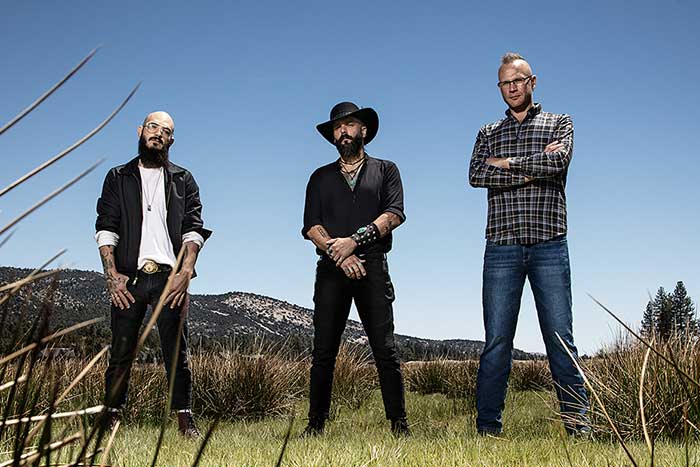
Was there a conscious effort to make sure that this record doesn’t sound like Killswitch Engage or that it stands apart from the first Times of Grace album?
Yeah, there definitely was. It was all spearheaded by Adam because he writes all the music, but we did have discussions about, “Let’s just have fun with this. Let’s go further than we have. Let’s stretch our sound.” We really want to pull away from the Killswitch sound completely. There are still elements of it, and there are songs that even sounded a bit closer to the style that we kept off the record that will eventually get released. We really wanted to make sure this album sounded and felt like we thought it should. With the title that we came up with, Loss and Separation, we really wanted to reflect that in the lyrics. It definitely was a conscious effort. I look forward to continuing to push the boundaries and the challenges of styles because I really enjoy doing something different and spreading our wings a bit.
“WE REALLY WANTED TO MAKE SURE THIS ALBUM SOUNDED AND FELT LIKE WE THOUGHT IT SHOULD.”
You and Adam share the vocal duties throughout all of the songs equally. How did you decide to divide each track up this way?
It’s a lot of work, but we just go where our voices naturally go. Adam does have a bit of a lower register than I do, and I have a higher to midrange register. So, our harmonies tend to really match up well. And we try to mix it up, too, so it’s not the same harmonies in the same song with a different verse or a different chorus. I love when the harmonies give me chills. It’s very much painstakingly mapped out according to the way that we think the song should sound. On this one especially, it’s very much a half and half effort. Adam took lead vocals on more songs on this album than he did on the first one. And some of that’s a happy accident because I wasn’t up to the task on certain songs during the writing of it. I was so depressed, having a really hard time. For example, “Forever,” the last song on the record, I wrote the lyrics, but I didn’t even bother singing it because I just didn’t even have the energy to do it. And he came up with all of the vocal melodies and all of the structure. It’s one of my favorite songs on record. He picked up the slack for me when I was unable to contribute. But I love that because it really shows how far he’s come along with his vocals. He sounds better than he ever has on this record. And his lyrics were on the next level. The last record I had to help fix stuff and make it a little more poetic. He’s a bit more of a direct writer than I am. I’m much more of a poet. But on this record I barely did anything to his lyrics, they were great the way they were. Adam is definitely the captain of the ship and I contribute artistically, but the vocals on this were definitely split down the middle and I love it. It makes it unique because of that.
Making drummer Dan Gluszak—who toured behind your first album—an official member of the band was a great move. How well do you guys get along?
He’s one of our brothers and one of our dear friends. The three of us get along famously. He’s just such a great drummer and he comes from more of an indie rock/R&B feel. So, he’s got a lot of swing. He’s got a funky, almost hip-hoppy feel to some of the stuff he does. And I think he brought a whole other element of groove. Adam is definitely more of a metal drummer. He hits different, he’s got a different feel to it. And Dan is just slick. Even his drum tones are warmer. He’s got his kick drums tuned a little lower and his snare has this vibe to it. We love his style and that was one of the big reasons for wanting him on the record and then making him a member because he fits in great with us. We’re all really good friends. He’s an amazing guy. We couldn’t imagine doing it without him.
“I’M DEFINITELY IN THE BEST PLACE I’VE BEEN IN MY LIFE, HONESTLY. BECAUSE OF EVERYTHING THAT TRANSPIRED, I FOUND A NEW HAPPINESS FOR MYSELF.”
As you previously stated about going through dark times, a bad relationship, and writing the song “Forever” and others, are you now a pretty good place? How does that affect your writing for future endeavors?
I’m definitely in the best place I’ve been in my life, honestly. Because of everything that transpired, I found a new happiness for myself. I love living in a new place. My mind is in a new place. As far as my inspiration, I draw from everything. Thankfully, moving forward, if I write a song now about tragedy or sadness, it can be very much about telling the story of somebody else who’s looking at the world around us. There’s enough inspiration to draw from to write a powerful song. And that’s usually what I do with Killswitch and other projects. It’s my story, but it’s also other people’s stories interwoven in my view of the world or what’s going on. You could simply turn on the news and get depressed. It’s very easy to draw inspiration and darkness from the world.
With the record’s production, what were you after as far as tones while in the studio, and how did you approach your vocals while recording?
The thing that I wanted more than anything, and I still want more of this in any project I do, is exploring my lower register, finding a rounder tone. I had vocal surgery in 2018, I had nodules removed, and I had to relearn how to speak and how to sing since then. And I’ve discovered the lower register of my voice, sort of a warmer, darker tone in my voice. And I really enjoy hearing that more than my higher register that I predominantly use in Killswitch. It was a real conscious effort of approaching the higher stuff and making sure that stuff is just accentuating parts and trying to use the lower register of my voice and the mid-range more because it sounds rounder and hits the ears differently. I’m a huge fan of 80s goth music, Peter Murphy, and a 90s alternative band called Sponge. So, I’m trying to do more of that stuff with Times of Grace. It was just like warm natural tones and bluesy and making sure the blues were represented as well because blues tones tend to really go well with my voice because I’m not one of those operatic vibrato singers. I’m more of a little rough around the edges. So, that’s where I come in with my vocals. As far as the production, Adam is always striving for something near perfect with everything he does. I think he remixed and remastered this album seven or eight times. He’s a bit of a perfectionist. We butt heads occasionally on that, but our relationship creates what we put out. And it’s a great relationship because of that.
“IT’S INSPIRING TO SEE PEOPLE WHO ARE WILLING TO MOVE FORWARD AND REMAIN FRIENDS AND NOT TALK SHIT ABOUT EACH OTHER”
I recently interviewed ex-Killswitch Engage singer Howard Jones, and he expressed nothing but joy about singing on “The Signal Fire” from Atonement. Plus, on the music video it looked like you guys were genuinely having fun.
Yeah, it was cool. It was an idea I came up with and it’s the time of where we’ve been with our relationship with him and all those guys. When they split ways, it was a bit odd for various reasons. And over the years, everything just got squashed. It’s inspiring to see people who are willing to move forward and remain friends and not talk shit about each other, because that often happens. People air their dirty laundry on social media or magazines. And that really never happened with Killswitch, and I admire that about those guys. I’d never really had a close relationship with Howard, but when he started coming around again after a few years, we eventually hung out, hit it off pretty quickly, and realized that we had a lot in common. It just felt right to have them bring him in and sing a song. Because it will show the fans that there’s no animosity, there’s no bad blood. And that’s important to show. It shows the character of the band, the way that we carry ourselves. And that process was definitely a lot of fun. What was interesting, too, I was in the studio running out of steam and it was right before I discovered I had nodules. So, the day before I went home to go to the doctor to get checked out, Howard arrived. On that day, I was unable to even do anything in the studio. Even the parts that I had written for him, thankfully, I already sang them. I had already mapped everything out the day before. I was there with a broken voice, really nervous about my career while listening to Howard belt it out in the studio. It was a very humbling, surreal moment. And then when it came time for the video, that was after I had gotten the surgery and was repaired and felt better. So, there’s a really cool vibe of redemption. And we did really enjoy that video shoot. It was a lot of laughs and really good vibe on the set.
Will Times of Grace be doing any shows or mini tours? And hopefully it won’t take another 10 years for a new album.
It’s hard to say. With the state of the world right now, and when things do come back live, we’ve got Atonement, which we never really toured on. We do have a lot of catching up to do, so it all depends on how much we’re touring with Killswitch, because I cannot see me going from one tour to the other without downtime. I would get burnt out. I’m sure Adam would as well. But we have talked about hopefully doing some mini tours. Ideally, something in the States—LA, Chicago, New York, something like that, and maybe go over to London. It would be great to be able to do little mini tours, but it all depends if it’s cost effective and if there’s interest. So, we’re just going to take it as it comes. Obviously, the main thing for us is making sure we get back on the road to tour for Atonement.
What’s the latest news on Killswitch Engage? What has the band been up to?
The one thing we’ve got in the horizon lines is September through November going out with Slipknot, Code Orange, and Fever 333, which would be a hell of a bill. It’s an arena tour and it’s six weeks. If that happens, that’ll be a hell of a way to come back to touring. And that’s the only thing I’ve solidified. There’s been a lot of talk about 2022 overseas, as well as making up for the tour we had to cancel with Light the Torch, which would be great to get back out there and get back in those cities we had to cancel. Also, just to get Howard onstage with us to do a couple of songs as well. It’d be a really nice treat for the fans. That’s really all we’ve got right now that I could even speak on. There are other things in motion, but it’s hard to tell what borders are going to be open, what countries we’re going to be able to go to next year.
What’s next as far as future endeavors? What will you be focusing on for the rest of the year?
Enjoying home, for sure. Because I love where I live up here in the Catskill Mountains. I’ve got a punk band called The Weapon. We’re hoping to do another EP. We put out one during the pandemic, which is very much like 80s style hardcore, and we’ve got some more stuff up our sleeves. It’s a fun project I’ve got going on and I’ve been working on various electronic projects during the pandemic as well, which might see the light of day. I’ve got an ambient album I put out last year on Bandcamp. I can’t stop working. I’m constantly working on something. But as far as what I put out, I’m not sure. The Weapon is definitely something on my radar. I love those guys, and it’s a super fun project, just writing fast, pissed off hardcore. And for those who don’t know, I have a podcast called Stoke the Fire with my partner Matt Stocks. That has been absolutely amazing and lifesaving for me, just having great conversations with people about life and mental health awareness and addiction. It’s been another great therapy for me in my life with this podcast.

